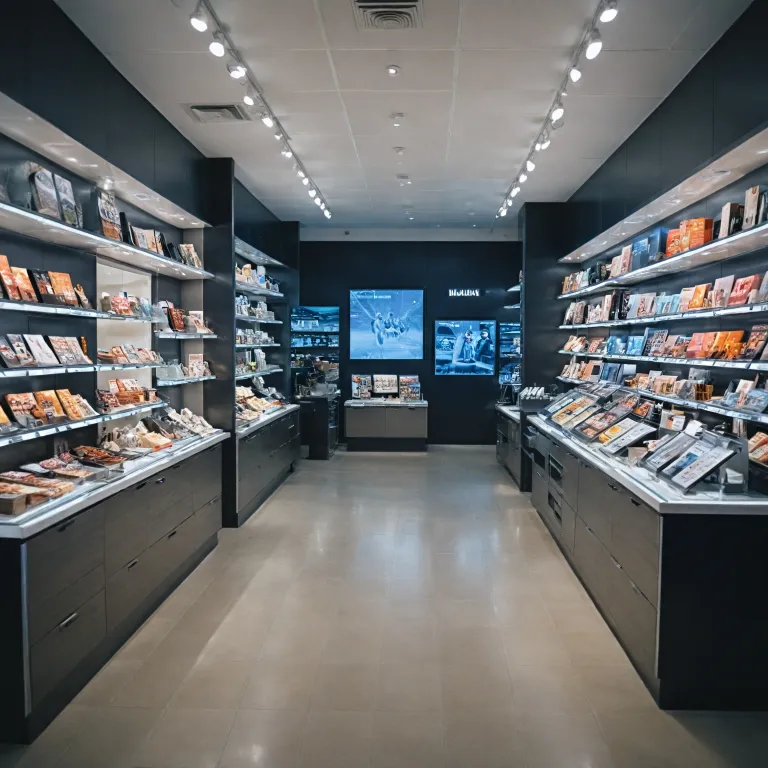Understanding Pre-Hire Solutions in Retail and Hospitality
Importance of Pre-Hire Strategies in Retail and Hospitality
The retail and hospitality sectors are known for their dynamic environments, which demand quick and effective hiring solutions. Given the high turnover rates and the need for a seamless recruitment process, businesses in these industries are turning to advanced pre-hire strategies to attract and retain top talent.
In these sectors, the emphasis is often placed on providing an exceptional candidate experience that aligns with a company's employer brand. Successful pre-hire strategies include a mix of digital tools and innovative processes that not only streamline staffing solutions, but also effectively highlight the brand's core values. This approach helps businesses stand out in a competitive market.
Key Components of Pre-Hire Solutions
- Paper-Free Processes: Embracing technology to eliminate paper-based methods can significantly enhance the recruitment process. By transitioning to digital formats, companies can reduce time-to-hire and foster a more organized experience for both candidates and hiring managers.
- Video Interviews: Leveraging video interviews allows for a more flexible and comprehensive assessment of candidates. This method not only saves time but also enables employers to evaluate the communication skills and personality fit of potential employees in the retail hospitality industry.
- Applicant Tracking Systems (ATS): Implementing an effective ATS can aid in managing the influx of applications. This system provides a structured and time-efficient way to screen and track candidates throughout the hiring process, ensuring that only top talent is selected.
For more insights on assessing candidates using AI technology, consider exploring
how HR evaluates candidate judgment in AI-powered interviews. This resource provides valuable information on optimizing candidate selection, focusing on skills and attributes that are crucial for long-term success.
Revolutionizing Screening and Assessment in Retail and Hospitality
The advent of artificial intelligence has brought with it advanced screening and assessment tools, designed to enhance the pre-hire process in the retail and hospitality sectors. As these industries are defined by fast-paced environments and high turnover rates, AI-powered tools provide effective solutions to efficiently identify and secure top talent.
AI-enhanced screening tools help streamline the initial stages of the recruitment process. By employing machine learning algorithms, these tools can sift through resumes and applications with a higher degree of accuracy than human capabilities alone. This not only reduces time-to-hire, but also ensures that hiring managers can focus their attention on candidates who meet specific skills and qualifications critical to the role.
Automated assessments are another significant facet of AI in the hiring process. These assessments integrate pre-employment tests, which evaluate candidates' skills, cognitive abilities, and cultural fit. Through data-driven insights, these tools help predict future job performance, allowing employers to make informed decisions. Leveraging such strategies not only enhances the employer brand but also aligns with long-term staffing solutions for sustaining a competitive edge in these dynamic industries.
Moreover, AI tools facilitate paper-free hiring experiences by incorporating digital assessments and video interviews—a major leap toward modern recruitment methods. These strategies offer candidates a seamless and engaging process, thus elevating the overall candidate experience.
Despite these advancements, AI in screening and assessment does not come without challenges and ethical considerations. Ensuring the technology is used responsibly is paramount to maintaining fairness, diversity, and inclusion within hiring practices. Nonetheless, when implemented thoughtfully, AI-driven solutions hold the promise of transforming recruitment in retail and hospitality into a more efficient and insightful process.
For more on this topic, consider exploring our resource on
navigating the challenges of specialist recruitment with AI.
Enhancing Candidate Experience with AI
Boosting the Experience for Candidates with Technology Integration
The integration of artificial intelligence in the realm of retail and hospitality is not just about enhancing efficiency, it plays a pivotal role in refining the journey for candidates. When it comes to recruitment in these sectors, the candidate experience is a crucial element that can greatly impact an employer's brand and reputation.
Retail and hospitality hiring requires quick, effective solutions to process hundreds or even thousands of applications swiftly. Staffing solutions that integrate AI allow for a more seamless interaction between potential hires and companies. The use of chatbots, for instance, provides candidates with instant responses to their inquiries, ensuring they are well informed and engaged throughout the hiring process. This immediate communication can significantly enhance their perception of the employer brand.
Streamlining Interactions Through Advanced Systems
Applicant tracking systems that leverage AI are instrumental in delivering a more personalized touch. These systems not only automate repetitive tasks but also offer candidates the opportunity to track their application status in real-time. A paper-free recruitment process aligns with sustainability initiatives while providing a modern, efficient path for candidates to follow.
Furthermore, video interviews facilitated by AI technology provide a flexible solution for both candidates and hiring managers, effectively reducing the time to hire. By enabling candidates to schedule interviews at their convenience, the process becomes more accommodating to their needs, thereby improving their overall experience.
Creating Long-term Connections
The candidate experience is not confined to the pre-hiring phase. Post-application interactions, such as timely feedback and follow-ups, contribute to fostering a positive long-term impression, aiding in talent retention and even turning candidates into future customers or brand advocates.
Leveraging top automation tools for managing candidates in ATS systems further optimizes this experience, allowing employers to focus on building meaningful relationships with top talent. These tools help in effective talent acquisition by providing comprehensive strategies that align with the needs of the retail and hospitality sectors.
Incorporating AI-driven strategies in the recruitment process not only serves to attract top talent but also enhances the overall experience for candidates, positioning employers as innovative and attentive brands in a competitive job market.
Data-Driven Decision Making in Recruitment
Gathering Insights for Informed Recruitment Decisions
In the retail and hospitality sectors, making precise recruitment decisions is critical. Integrating data-driven decision making into the hiring process allows employers to significantly enhance their recruitment strategies. Using sophisticated algorithms, AI can analyze vast pools of data from a variety of sources to uncover patterns and trends related to candidate performance, engagement, and fit for a role.
One of the most effective strategies is leveraging AI in applicant tracking systems. These systems can process applications faster than traditional methods, identifying top talent while reducing the time-to-hire. Hiring managers benefit from detailed analytics, aiding them in making informed choices when selecting candidates.
Another advantage is the ability to enhance the employer brand through insights drawn from AI. By analyzing feedback and interaction data, employers can tailor their recruitment process to offer an exceptional candidate experience. This can result in long-term benefits for maintaining a paper-free process and boosting the organization’s reputation among potential hires.
AI's data analysis capabilities also support prediction models, anticipating future staffing needs. By identifying both short-term and long-term trends, companies can optimize their staffing solutions, reducing the risk of overstaffing or staffing shortages.
However, this approach comes with challenges—specifically regarding data quality and ethical considerations. Employers need to ensure they use unbiased data, maintaining a fair recruitment process and upholding ethical standards. Despite these challenges, the benefits of data-driven decision making in recruitment provide a clear advantage in staying competitive in retail and hospitality hiring. This approach not only refines the recruitment process but enhances the overall effectiveness of talent acquisition strategies.
Challenges and Ethical Considerations
The Ethical Landscape of AI Implementation
Incorporating AI into hiring processes presents various challenges and ethical considerations that must be carefully examined. As employers in the retail and hospitality sectors strive to leverage AI for more effective talent acquisition, it's crucial to address potential issues.
Firstly, the transparency of AI-powered screening and assessment tools must be ensured. This means that candidates should understand how their data is being used and for what purpose. AI-driven systems often rely on large datasets to enhance candidate experience and efficiency. However, without clear communication, candidates might feel uneasy or distrustful of the process.
Moreover, fairness and bias in AI algorithms are significant concerns. While AI can streamline pre-hire screening, if not properly monitored, it may inadvertently favor certain groups over others. This necessitates rigorous testing of AI systems to ensure they comply with equal opportunity employment standards, thereby safeguarding both the candidate and employer brand.
Another aspect is the data-driven decision-making in recruitment and the reliance on applicant tracking systems. With vast amounts of data and powerful algorithms at their disposal, hiring managers must remain vigilant in maintaining human oversight. Automated systems should not replace intuition and human judgment, particularly in fields like hospitality where interpersonal skills and a candidate's alignment with the employer brand are crucial.
Finally, the rapid implementation of technology creates a necessity for continual adaptation in staffing solutions. Recruitment strategies must evolve to include training programs that help employees keep pace with technological advancements, ensuring a seamless integration of AI into the hiring process.
These challenges highlight the importance of carefully crafted strategies that not only enhance time to hire but also maintain ethical standards and support long-term success. By addressing these ethical considerations head-on, organizations can harness AI's potential to attract top talent while fostering trust and inclusivity.
Future Trends in AI for Retail and Hospitality Hiring
Emerging AI-Driven Trends in Retail and Hospitality Hiring
The future of AI in hiring processes for the retail and hospitality sectors is promising, with several trends positioned to reshape human resources and talent acquisition strategies. As hiring managers continue to seek effective pre hire solutions, staying ahead of these trends is crucial to attracting and retaining top talent.
- Advanced Talent Acquisition Strategies: AI is enhancing staffing solutions by streamlining the recruitment process. Retail and hospitality employers are leveraging AI to refine their talent acquisition strategies, making them more targeted and efficient. This focus aligns with improving employer branding, ensuring that businesses remain competitive in attracting candidates.
- Real-Time Data Analytics: AI furnishes employers with in-depth, real-time insights into recruitment processes. Such data-driven strategies help identify bottlenecks in the hiring process quickly, allowing for more effective candidate assessments and shorter time to hire.
- Interactive Video Interviews: Video interviews, powered by AI, are becoming integral to the pre hire process. These interviews not only save time but also allow hiring managers to assess interpersonal skills and emotional intelligence more accurately, critical attributes in retail and hospitality roles.
- Enhanced Candidate Experience: Future-forward AI systems aim to elevate the candidate experience by personalizing the recruitment journey. AI can help tailor communication, ensuring candidates feel valued from initial contact to final offer, thus strengthening the employer brand.
- Long-Term Talent Engagement: AI tools are not only about hiring but also about long-term engagement. Intelligent tracking systems enable employers to maintain relationships with candidates who may not be immediately hired, fostering a talent pool ready for future opportunities.
In summary, AI continues to pave the way for more efficient and effective hiring solutions in the retail and hospitality sectors. By embracing these trends, employers can successfully navigate the challenges associated with attracting top talent, thereby enhancing their overall recruitment efforts and employer brand.













